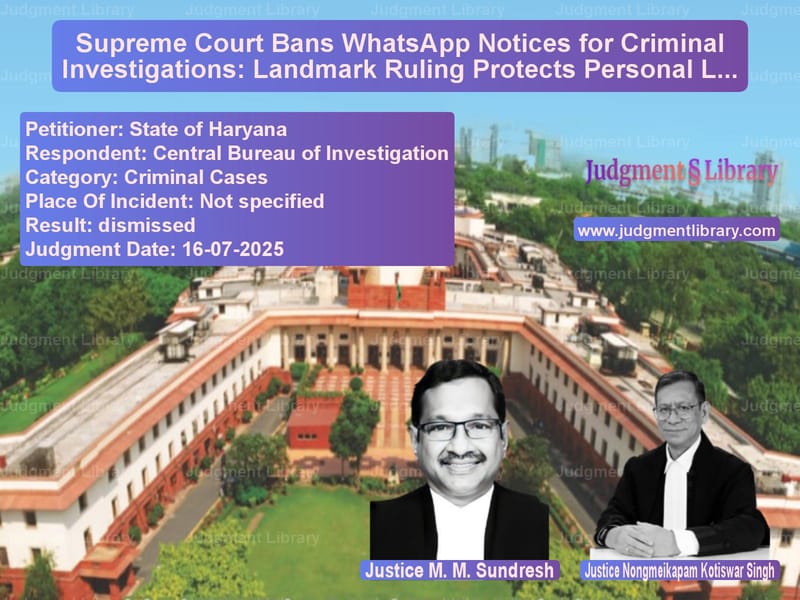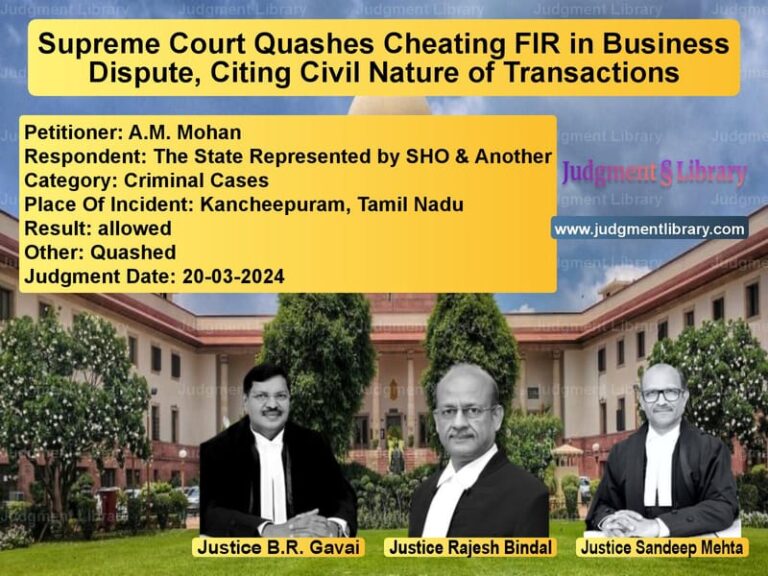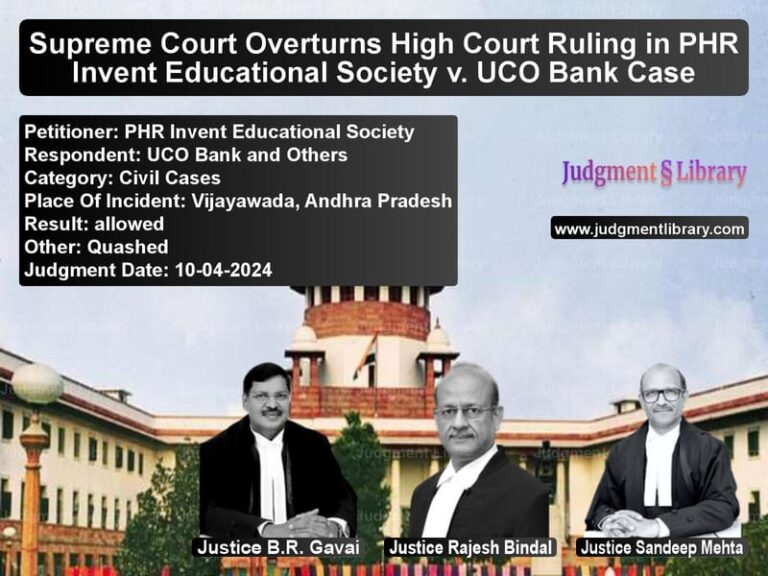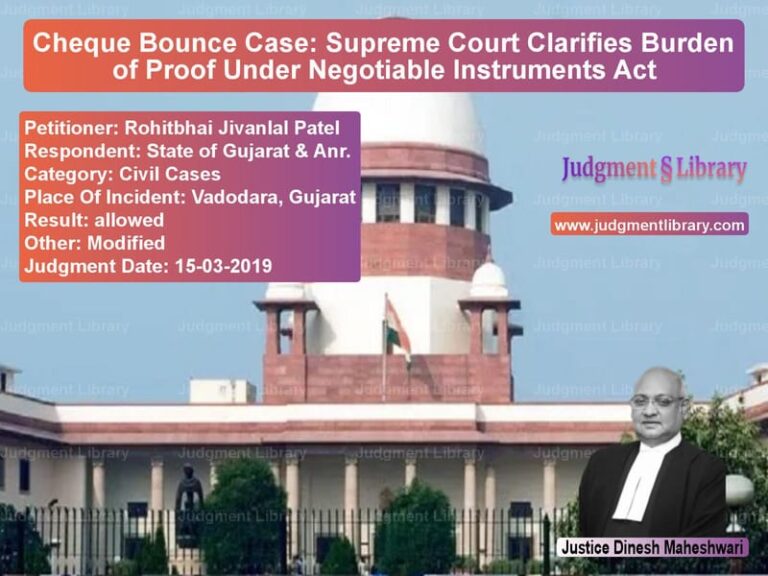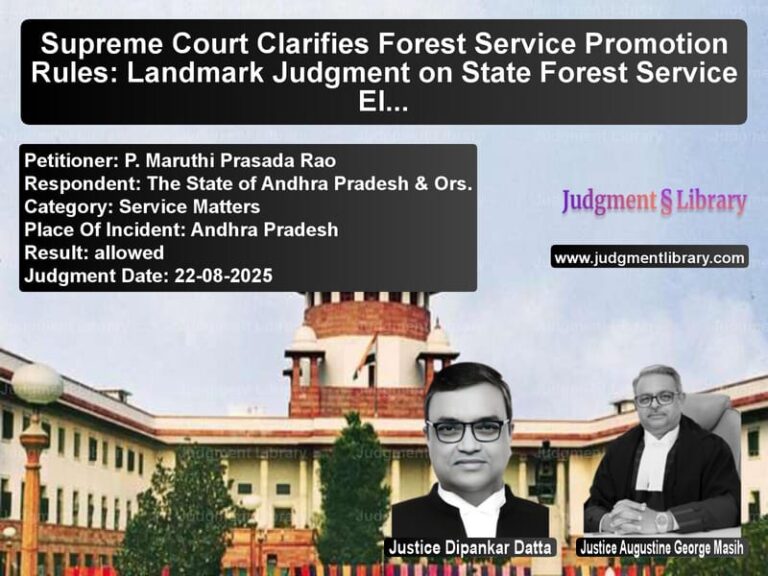Supreme Court Bans WhatsApp Notices for Criminal Investigations: Landmark Ruling Protects Personal Liberty
In a significant judgment that reinforces the constitutional protection of personal liberty, the Supreme Court of India has firmly rejected the use of WhatsApp and other electronic communications for serving crucial legal notices in criminal investigations. The ruling came in response to an application filed by the State of Haryana seeking modification of the court’s earlier order that had restricted electronic service of notices under Section 41-A of the Code of Criminal Procedure.
The legal battle centered around the interpretation of the newly enacted Bharatiya Nagarik Suraksha Sanhita (BNSS), 2023, which replaced the colonial-era Criminal Procedure Code. At the heart of the controversy was whether investigating agencies could use modern communication tools like WhatsApp to serve notices under Section 35 of the BNSS, which requires individuals to appear for investigation in criminal cases.
The State of Haryana, represented by its counsel, mounted a vigorous defense of electronic service, arguing that “a notice under Section 35 of the BNSS, 2023 is only an information to the concerned person that he is required to join the investigation, and is not liable to be arrested at that time.” The state emphasized practical considerations, stating that “service of notice through the mode of electronic communication is required to ensure that the concerned person does not evade service of notice, and that precious resources of the State are not wasted.”
The state’s legal team pointed to specific provisions of the new law, arguing that “Section 64 of the BNSS, 2023 has been brought to the attention of this Court. Placing reliance on the Proviso to Section 64(2) of the BNSS, 2023 he submitted that it permits the service of summons via the mode of electronic communication also, which would indicate that there is no bar in serving of summons through the mode of electronic communication.” They further contended that “when BNSS, 2023 statutorily recognizes electronic mode of service of summons issued by the Court, then the notice issued under Section 35 of the BNSS, 2023 should also be permitted to be served through the electronic mode.”
Making a technological argument, the state’s counsel submitted that “a careful reading of Section 64(2) and Section 71 of the BNSS, 2023 would indicate that the former relates to system-generated summons, i.e., the e-Summons App, hence the requirement of the Court’s seal to make them look authentic, whereas, the latter relates to physical summons duly signed, scanned and transmitted electronically.” They asserted that “a notice under Section 35 of the BNSS, 2023 falls within the same category as a summons under Section 71 of the BNSS, 2023, and therefore must be permitted to be transmitted electronically.”
The state also invoked the broader legislative intent, arguing that “Section 530 of the BNSS, 2023 lays down that trials, inquiries and proceedings may be held through the mode of electronic communication. Therefore, excluding service of notice under Section 35 of the BNSS, 2023 through the mode of electronic communication, would be an exception to the entire scheme of affairs.”
However, the amicus curiae (friend of the court) appointed to assist in the matter presented compelling counter-arguments, emphasizing that “notice served through WhatsApp or other modes of electronic communication is not contemplated as a mode of service under Section 35 of the BNSS, 2023 since the same is not in accordance with Chapter VI of the BNSS, 2023, and hence cannot be treated as a valid mode of serving notice.”
The amicus curiae drew a crucial distinction, pointing out that “the newly added proviso to Section 64(2) of the BNSS, 2023 permits the mode of electronic communication as a means to serve summons, only in those cases where the summons bear the image of the Court’s seal. Since a notice issued under Section 35 of the BNSS, 2023 is not from the Court, the Investigating Agency must necessarily adhere to the regular mode of service.”
Addressing the state’s reliance on Section 530, the amicus curiae countered that “Section 530 of the BNSS, 2023 states that all trials, inquiries and proceedings under the BNSS, 2023 may be held in electronic mode. The legislature, in its wisdom, has excluded investigations from the scope of the aforesaid section, thereby meaning that the same have been consciously omitted from the purview of the procedures which are permissible through electronic means.”
The most powerful argument against electronic service came from the fundamental rights perspective: “since a notice under Section 35 of the BNSS, 2023 is issued by the Investigating Agency, and the breach thereof leads to arrest and deprivation of the liberty of an individual, it is appropriate that such a notice be served in person on the accused, and not through the mode of electronic communication.”
The Supreme Court, in its detailed analysis, began by acknowledging that “the Legislature, envisaging the extensive reliance on modern means of communication in the present times, has recognised the mode of electronic communication within the ambit of the BNSS, 2023.” However, the court emphasized that “the Legislature has clearly demarcated the extent of permissible usage of modes of electronic communication, under the BNSS, 2023.”
The court’s reasoning focused heavily on the constitutional protection of liberty, stating that “the protection of one’s liberty is a crucial aspect of the right to life guaranteed to each and every individual, under Article 21 of the Constitution of India. The procedure encapsulated in Section 35(6) of the BNSS, 2023, seeks to secure this fundamental right, from encroachment by the relevant Authority.”
In a crucial observation, the court noted that “the Legislature, in its wisdom, has specifically excluded the service of a notice under Section 35 of the BNSS, 2023 from the ambit of procedures permissible through electronic communication, that have been delineated under Section 530 of the BNSS, 2023.”
The court adopted a strict interpretative approach, holding that “on a plain reading of the BNSS, 2023, the restrictions imposed by the Legislature on the use of electronic communication, to only certain procedures, precludes the use of electronic communication for any other procedure, for which it has not been specifically permitted by the BNSS, 2023.”
The judges made a fundamental distinction between different types of legal processes, explaining that “a summons issued by a Court under Sections 63 or 71 of the BNSS, 2023, and a notice issued by the Investigating Agency under Section 35 of the BNSS, 2023 travel on different footings and cannot be equated with each other. A summons issued by a Court is a judicial act, whereas a notice issued by the Investigating Agency is an executive act.”
The court highlighted the grave consequences of non-compliance with Section 35 notices, observing that “a notice under Section 35 of the BNSS, 2023 could have an immediate bearing on the liberty of the individual in case of its non-compliance, as laid down under Section 35(6) of the BNSS, 2023.” This contrasted with summons to witnesses, where “a summons under Section 71 of the BNSS, 2023, has no immediate bearing on the liberty of an individual in case of its non-compliance.”
The court also noted that the BNSS does provide for electronic communication in limited investigative contexts, specifically under “Sections 94(1) and 193(3) of the BNSS, 2023 respectively,” but emphasized that “none of these procedures have any bearing on the liberty of an individual.”
In its concluding remarks, the court firmly stated that “when viewed from any lens, we are unable to convince ourselves that electronic communication is a valid mode of service of notice under Section 35 of the BNSS, 2023, since its conscious omission is a clear manifestation of the legislative intent.” The court warned that “introducing a procedure into Section 35 of the BNSS, 2023, that has not been specifically provided for by the Legislature, would be violative of its intent.”
The judgment represents a significant victory for civil liberties in the digital age. While acknowledging the efficiency benefits of electronic communication, the Supreme Court has drawn a clear line where personal liberty is concerned. The ruling ensures that individuals cannot be deprived of their freedom based on a WhatsApp message that might be missed, ignored, or never received.
This decision also serves as an important interpretation of the new criminal procedure law, establishing that technological convenience cannot override constitutional protections. The court has reaffirmed that when it comes to matters affecting personal liberty, the procedure must be rigorous, reliable, and in strict compliance with statutory requirements.
The judgment balances the needs of modern investigation with fundamental rights, ensuring that while technology can aid the justice system, it cannot compromise the safeguards that protect citizens from arbitrary state action. This ruling will likely influence how other digital communication tools are used in legal processes, setting a precedent that personal liberty requires more than just technological efficiency—it demands procedural certainty and reliability.
Petitioner Name: State of Haryana.Respondent Name: Central Bureau of Investigation.Judgment By: Justice M. M. Sundresh, Justice Nongmeikapam Kotiswar Singh.Place Of Incident: Not specified.Judgment Date: 16-07-2025.Result: dismissed.
Don’t miss out on the full details! Download the complete judgment in PDF format below and gain valuable insights instantly!
Download Judgment: state-of-haryana-vs-central-bureau-of-in-supreme-court-of-india-judgment-dated-16-07-2025.pdf
Directly Download Judgment: Directly download this Judgment
See all petitions in Bail and Anticipatory Bail
See all petitions in Cyber Crimes
See all petitions in Legal Malpractice
See all petitions in Criminal Defamation
See all petitions in Other Cases
See all petitions in Judgment by M.M. Sundresh
See all petitions in Judgment by N. Kotiswar Singh
See all petitions in dismissed
See all petitions in supreme court of India judgments July 2025
See all petitions in 2025 judgments
See all posts in Criminal Cases Category
See all allowed petitions in Criminal Cases Category
See all Dismissed petitions in Criminal Cases Category
See all partially allowed petitions in Criminal Cases Category

